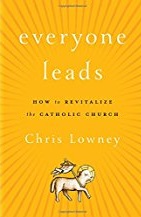Although the Irish Catholic Church is clearly in deep crisis – given the absence of younger generations and the imminent cliff fall in priestly numbers – Irish bishops don’t ever seem to use the word ‘crisis’. Why is that?
Why instead do they tend to talk up the tiniest of ‘green shoots’, apparently in denial of a looming desert?
Similar questions – but about US bishops – were recently put by Commonweal to Chris Lowney, author of ‘Everyone Leads: How to Revitalize the Catholic Church‘.
His answer was as follows:
“First, in my old world of banking, there was a single source of truth, a set of numbers by which we all agreed we were going to understand how things are going. We don’t really have that in the church. We have a headline number, the number of baptized Catholics, which grows inexorably every year, but under the surface there’s this enormous level of challenges and problems and data that we don’t really see. I also wonder if the church has been so buffeted by terrible abuse scandals, maybe people in position of authority see their role as boosting morale and cheerleading.”
He argues that instead of complaining about this ‘denial’, Catholics at the base could be seeking support for small scale ‘entrepreneurial’ initiatives aimed at specific problems.
He also argues that we need to be talking one-to-one – and less ‘intellectually’ – about the specific problems of families – e.g. of teenagers who want to ‘opt out’ of family mass-going.
“If I mention the New Evangelization to (parents), even a lot of people who regularly go to church don’t know what that’s about, or if they know the phrase they certainly don’t know what they’re supposed to do. But, if I say, how are your kids doing, more than half of the time the kid no longer goes to church and the parent really feels discouraged, sees a problem and wants to know what could have been done. The concept of a New Evangelization may mean nothing to them — but my kid, that means a heck of a lot to them. The point I’m trying to make is that impulses like these would be much more successful if we were a little less intellectual about it. It struck me as very intellectually packaged in the way it was rolled out, and instead we could just speak as human beings about how you feel about your own kids, your neighbors, the fact that your church’s viability is now in question. We have to learn to talk about these issues in a way that makes me care about people I know, about my own church, my own parish. Then, people themselves would come up with actionable ideas.”
Do we need a more ‘entrepreneurial’ church in Ireland? If so, might Chris Lowney’s book be a starting point?
Click here for the full Commonweal interview.


0 Comments